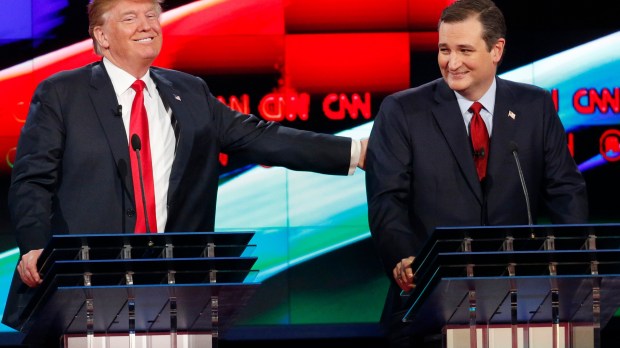With last night’s debate still fresh in the public memory, Michael O’Laughlin has a good explanation at Crux:
Brian Burch, president of Catholic Vote, said lay and ordained Evangelicals often see steering fellow believers toward particular candidates as part of their job, whereas Catholic priests and even some lay heads of Catholic organizations are much more reticent to engage directly in politics. “They don’t see a need to invite the sorts of divisions that politics often brings,” he said. John Gehring, whose book about the political landscape of the US Catholic Church, “The Francis Effect,” agrees. “Catholic teaching views politics and public life as essential parts of serving the common good,” he said. “But most Catholic clergy recognize that even the appearance of an endorsement undermines the Church’s ability to speak truth to power and offer a moral framework for our policy debates.” …Then there is the issue of ecclesial structure, which may make it more difficult for Catholic clergy to show support for specific candidates. Evangelical pastors are free of central oversight, able to run their churches as they see fit, which may include heavy political involvement if they so desire. Catholic bishops and priests, on the other hand, operate within a strict hierarchical model, one in which public endorsements of political candidates are discouraged. The US Conference of Catholic Bishops released a document last March reminding Catholic dioceses and parishes that the IRS prohibits them from endorsing political candidates, and urging them to tread carefully when it comes to political activity. Some dioceses add another layer of restrictions. For example, Catholic dioceses in Virginia tell Church employees that they “must make clear that they are not acting as representatives of the Church or Church organizations,” if they engage in partisan political activity.
I touched on this subject a couple years back at Patheos, and noted a priest who seemingly supported a candidate for mayor of New York, by appearing in a TV ad for him. I noted at the time:
It seems perilously close to violating the political activity guidelines of the IRS(particularly since he’s doing it in his capacity as director of a nonprofit Catholic food pantry.)
A reader later wrote to add that canon law does have something to say about clergy and political activity:
Canon 285 directs that “clerics are to refrain completely from all those things which are unbecoming to their state, according to the prescripts of particular law.” The canon continues in §3: “Clerics are forbidden to assume public offices which entail a participation in the exercise of civil power,” and §4 forbids clerics from “secular offices which entail an obligation of rendering accounts. . . .” Canon 287, §1 reminds all clerics that “most especially, [they] are always to foster the peace and harmony based on justice which are to be observed among people,” and §2 directs that “they are not to have an active part in political parties and in governing labor unions unless, in the judgment of competent ecclesiastical authority, the protection of the rights of the Church or the promotion of the common good requires it.”
Archbishop Charles Chaput has also weighed in on this subject back. From an essay in 2008:
It’s very dangerous for the Church to identify with one political party. It’s not my business to tell people to vote for John McCain or Hillary Clinton or Barack Obama. And while I worked for Jimmy Carter’s presidential campaign as a volunteer when I was a young, I don’t think any Catholic should feel comfortable today in either major political party—Democrat or Republican. But that doesn’t really get us off the hook, does it? The problem is that the Church teaches moral truth, and truth has obligations for human behavior—including the social, economic, and political kind. The Church is never mainly a political organism, but her witness for justice always has political consequences. For example, killing unborn children is a form of homicide. It’s a profound attack on human dignity, because all other rights depend on the right to life. It’s not the only important issue facing our country. But it is the foundational one at this moment in our nation’s history. We can’t ignore it. Cooperating in abortion or quietly tolerating it is a grave evil. We can incrementally seek to restrict and eliminate abortion, but we can never accept it as a so-called right. And if that truth inconveniences one or another political candidate, well, that’s their problem. It’s not the fault of the Church. It is the job of Catholic laypeople to change the thinking of their political party and their political leaders with the tools of their Catholic faith. But it is the job of priests to give people those tools—to form Catholic laypeople to think and act as disciples of Jesus Christ, in a manner guided by the teaching of the Church. Just as Catholic laypeople should be the leaven of Jesus Christ in the public square, so we priests need to be the leaven of Jesus Christ in lives of our people.

